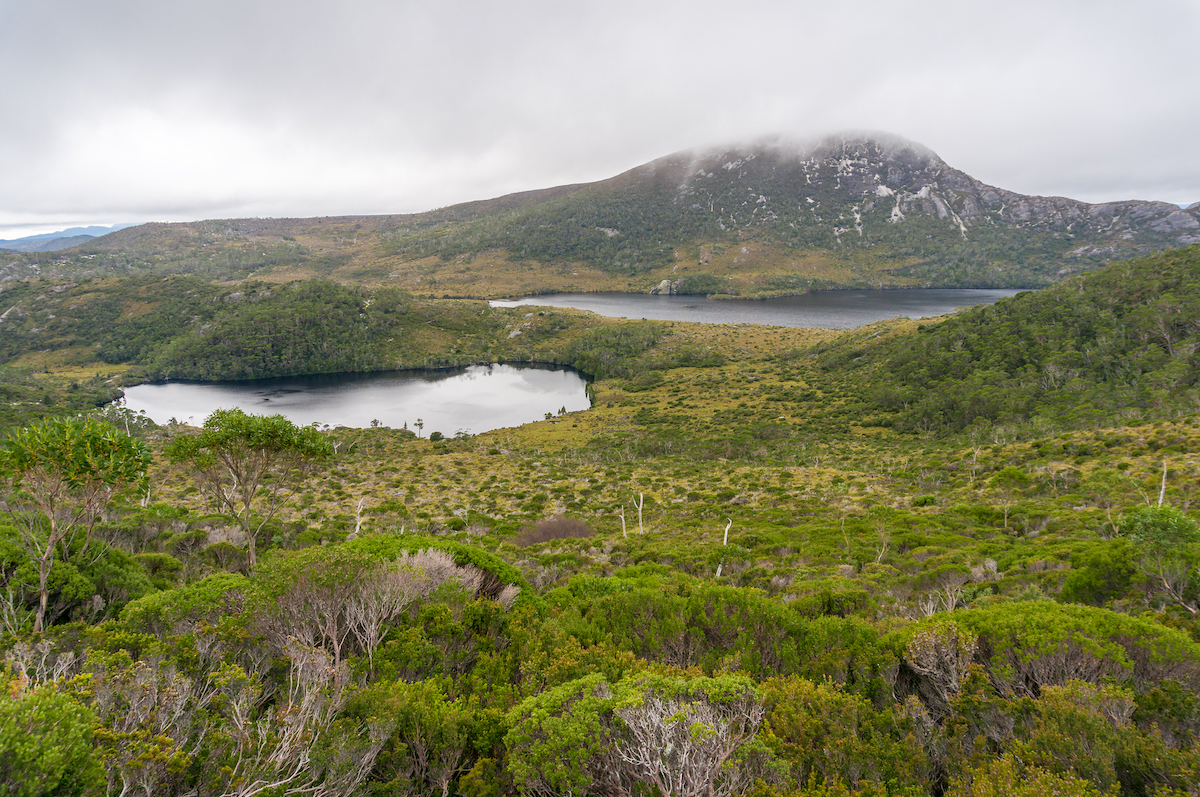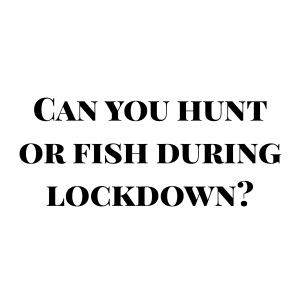On Saturday 1 May 2021, Tasmanians go to the polls to choose their next government and to decide who will stand up for them in parliament to protect their freedoms.
Nobody likes talking politics. Like religion, it is one of those taboo topics that makes people uncomfortable. Perhaps that’s why so many hunting, fishing and outdoor groups and organisations have chosen to stay neutral (aka silent) on politics. But does silence really work?
Much like the ostrich with its head in the sand, political neutrality doesn’t stop the world from changing. It just means you won’t have any influence on which direction it changes to.
Minors over majors
 This election is going to be less about which major party is in power and more about which minor party will gain a voice (and therefore a vote) in parliament.
This election is going to be less about which major party is in power and more about which minor party will gain a voice (and therefore a vote) in parliament.
You only have to look at recent elections around the world to see that incumbent leaders have mostly retained power. It’s pretty much why Peter Gutwein rolled the dice and chose to go to the polls 12 months early. His approval ratings are still high but starting to drop away. And with the Tasmanian Labor Party basically crapping the bed with internal politics and back flips on policies, there’s very few who don’t see Libs winning government with ease.
So if the major seats are all but sewn up, why should we even care about this election?
First, let’s take a short trip back through political history to see how much sway one voice in parliament can actually wield.
Prior to the mid-1980s, the Greens did not exist at all. For years, they were considered a fringe group of radical protesters with no power and no chance of gaining seats. In fact, as any Tasmanian knows, the Greens were virtually unknown before they gained their first seat in Tasmania in 1986. Six years later, the Australian Greens were formed, and less than 30 years later, there’s not a state in the country that hasn’t witnessed some kind of Green-influenced shutdown or lockout.
The Australian Greens are now the third largest political group in Australia and have 33 people holding seats in state and federal politics around the country, not to mention how ingrained they have made themselves in local politics at a council level!
The Tasmanian Greens currently hold 2 seats in the State Parliament and are running 25 candidates in this coming election. It’s clear they want to increase their foothold.
The Animal Justice Party (AJP) did not exist until 2009 but less than 12 years later, they have 3 members holding seats around the country. And as any Victorian hunter can attest, they are gaining sway!
The AJP have taken some very public swings at everything from bow hunting to duck hunting and pig hunting. But it’s not just hunting in their sights. One look at their policies shows they oppose any sport, industry or activity that ‘uses’ animals. That includes fishing, farming, horse racing, horse riding, medical research and even pet ownership. They believe animals should be granted the same rights as humans, which means any taking of their life could result in a murder or manslaughter charge. In Victoria, the AJP have a voice and a vote on the future of the Animal Welfare Act, which given their views, is truly terrifying for any sane person!
AJP has never held much sway in Tasmanian politics, but they are doing everything in their power to change that in this election, running 4 candidates across the state.
If they win even one seat, you can bet your ass they will come after hunting in a big way.
The Shooters, Fishers and Farmers Party (SFF) has also been seen as a fringe group in the past, with even hunters, fishermen and the farming community seeing them as a one-issue party not worthy of their vote – or at least not their number 1 vote.
And that’s if they had heard of them at all. As a grassroots party with very little money and even fewer volunteers, SFF lacked the pizzazz and flare of the bigger, more moneyed parties. Not to mention they are all but ignored (or at least derided) by the media.
Hand on heart, when we first heard of SFF, we thought the exact same thing. If we gave them a vote at all, it was always much further down the list. Surely the economy and health were more important than our ability to hunt or fish.
But over the last few years, we have seen how much our personal freedoms are coming under fire from far-left political groups we thought had no power. If we don’t start standing up for the things that are important to us, or at the very least, giving our vote to those who will, we will lose all that we hold dear.
Imagine a world where hunting was illegal, fishing was taboo, 4WDing was banned, the only wilderness you could visit was on a manicured path, camping sites had to be registered, only plants could be farmed and any meat you were allowed to eat had to be grown in a lab?
Given the minor parties standing in this election, that reality is not so far fetched!
This election, we will be voting for SFF Tasmania and we encourage anyone who values their freedoms and rights to do the same.
Below is an outline of their candidates for each electorate, as well as their policies on a broad range of topics.
SFF Tasmanian Candidates
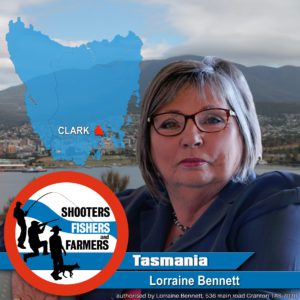
Lorraine Bennett - Clark Electorate
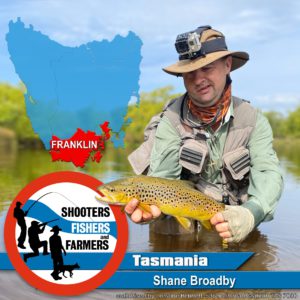
Shane Broadby - Franklin Electorate
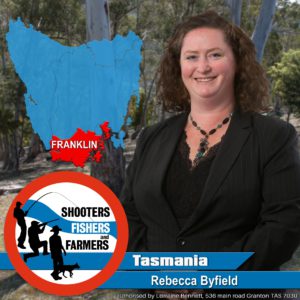
Rebecca Byfield - Franklin Electorate
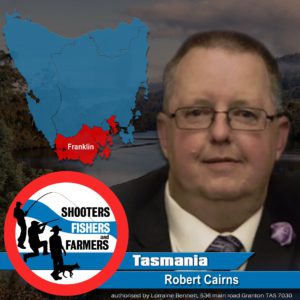
Robert Cairns - Franklin Electorate
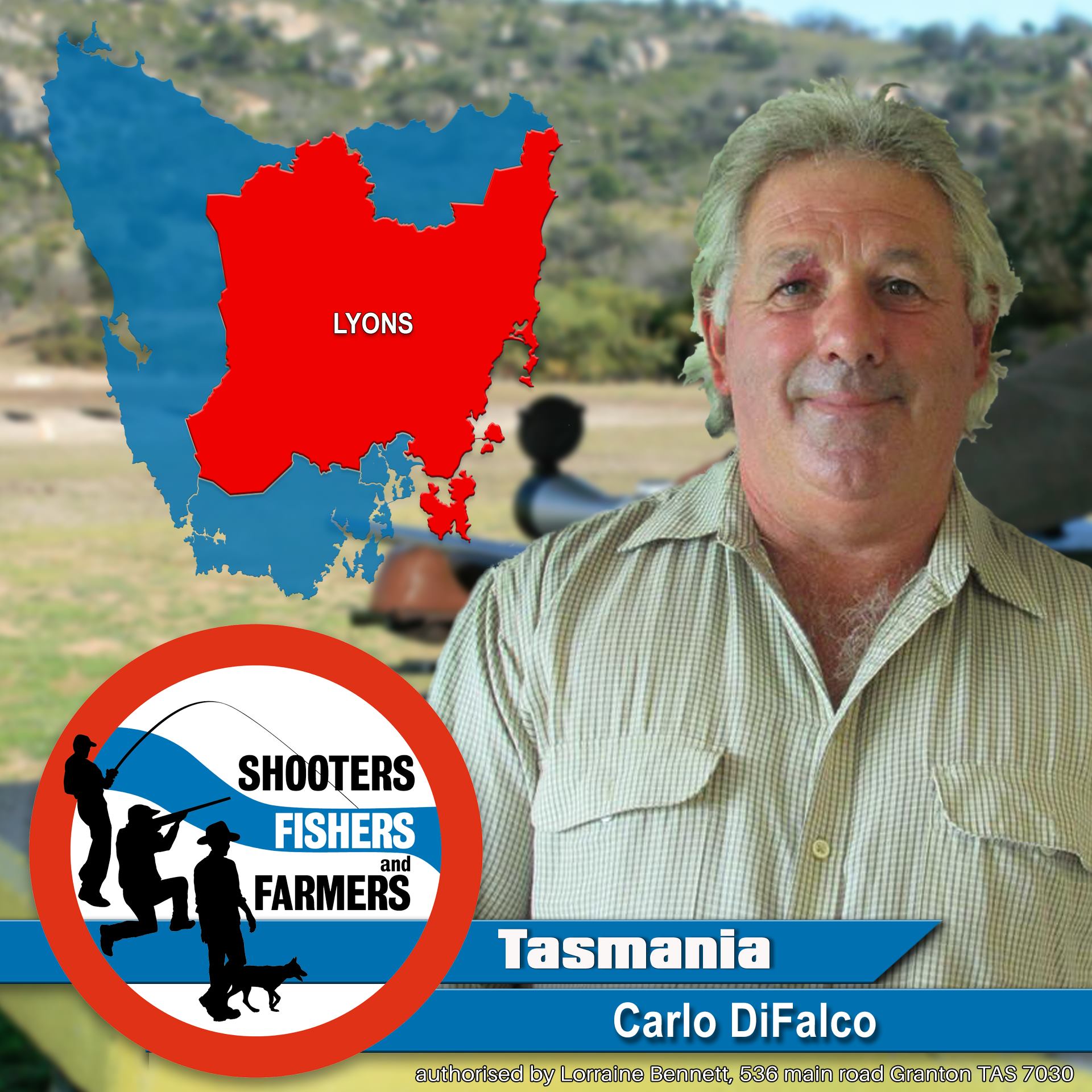
Carlo Di Falco - Lyons Electorate
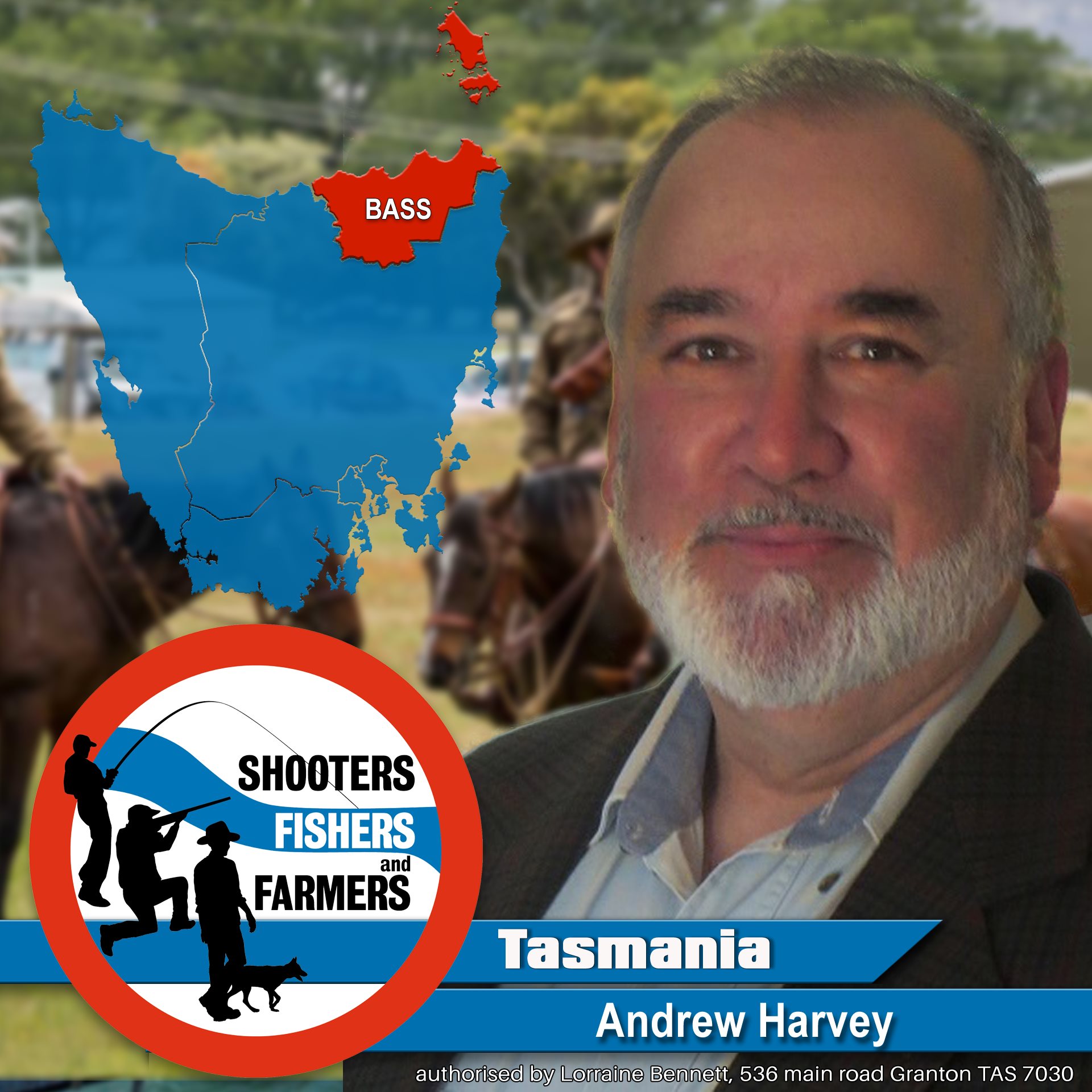
Andrew Harvey - Bass Electorate
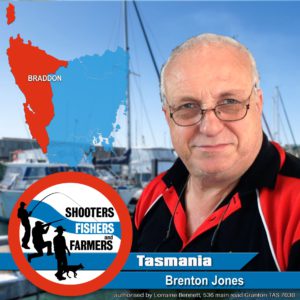
Brenton Jones - Braddon Electorate

Andrew Large - Clark Electorate

Kim Swanson - Braddon Electorate
We were surprised to find that SFF Tasmania had policies that extended far beyond their core activities. Below, is a summary of the policies they are taking to the election.
SFF Tasmania Policy Summary
Shooters, Fishers & Farmers Party Tasmania (SFF Tasmania) was started with an aim to protect the freedoms, rights and culture of all Tasmanians, both now and for generations to come. There is a growing discontent from amongst everyday Tasmanians, particularly rural and regional Tasmanians, that the major parties have largely ignored their needs, only calling on them during election campaigns when they need their support and votes, but promptly forgetting their promises the minute the polling booths close.
SFF Tasmania believes that Tasmanians deserve better. They deserve politicians that remember their role is primarily to serve the public and to be a voice for their constituents.
They have built a sensible policy platform based on communication with real people all across Tasmania and feel their policies not only reflect the needs of real Tasmanians but also believe that they are based on common sense and are realistic aims that governments should be seeking.
Each of their policies are grounded in the three pillars of freedom, rights and culture.
Freedom
SFF Tasmania is committed to protecting freedom of speech, freedom of association, and freedom of religious belief. They believe that freedom should form the cornerstone of Australia’s democracy. Sadly, they feel that these basic freedoms continue to be eroded by governments and a political class that is out of touch with ordinary citizens.
Rights
Despite pressure from the UN, Australia remains one of the few Western democracies to deny its citizens a Bill of Rights that enshrines their inalienable rights to be free to live without undue and unnecessary intrusion by the government. SFF Tasmania is committed to pushing both the state and Federal governments to remove oppressive red and green tape and to implement a basic Bill of Rights for Australian citizens.
Culture
SFF Tasmania is committed to protecting traditional and cultural heritage including ancient heritage, western culture, traditional recreational pursuits, and pluralistic democracy.
If elected to parliament, they have said that their candidates will use their vote to pursue the following policies:
Health Policy
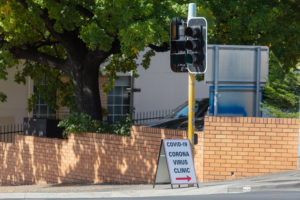 SFF Tasmania believes that the backlog and weakness of Tasmania’s health system stems from the removal of health services in rural and regional areas, and the reduction of bulk billing options throughout Tasmania.
SFF Tasmania believes that the backlog and weakness of Tasmania’s health system stems from the removal of health services in rural and regional areas, and the reduction of bulk billing options throughout Tasmania.
As a result, more people are either having to travel from rural and regional areas to urban centres for basic health care or delaying health care until the problem becomes critical.
They have also seen an influx of minor ailments presenting at hospital emergency departments as struggling Tasmanians can no longer afford to attend their local GP due to the lack of bulk billing options.
All of these scenarios place unneeded pressure on urban health facilities, often clogging up hospital emergency departments with non-emergency cases.
If elected, SFF Tasmania will use their vote in parliament to recommend:
- Increasing accessible preventative health services in regional communities and improving in-home and local community delivered palliative and community health care services. They believe this will keep people in their homes and free up hospital and emergency beds currently being utilised by non-emergency cases.
- Developing an incentive package to attract qualified health staff to regional areas and adopting a rural health policy focused on prevention and improving health literacy.
- Expanding patient transport services to service rural areas to reduce dependence on ambulances and free up ambulances for genuine emergencies.
- Increasing bulk billing options for general medical services throughout the community that makes obtaining general medical consultations affordable for all Tasmanians.
- Developing a bipartisan committee or board that oversees both health and child protective services. They believe this would ameliorate politics from these departments and could be used to identify major deficiencies, develop strategies around staffing levels, hospital locations and capacity, set budgets and develop a 20-year health plan for the future.
Education Policy

SFF Tasmania views high quality education as the cornerstone and foundation of our society and its future. With over 50% of adults in Tasmania considered functionally illiterate, access to comprehensive, inclusive and affordable education is not only a human right and a central tenet to quality of life, the see it as the roadmap to our state’s social and economic growth and to environmental awareness, understanding and appreciation.
Tasmanians need to meet the new century’s challenges of globalisation with openness and resilience. Critical thinking, continual skill renewal and operational flexibility are essential keys to future career and workplace decision making. Effective and relevant training and management practices will be paramount.
They believe the education of young people must include an understanding of the connectedness with the natural environment as a central focus, an understanding and enjoyment of it and the knowledge to care for it through evidence-based, informed management. An understanding of how our basic human needs are met, especially how food is grown by farmers working responsibly within the unique Tasmanian environment should be engendered.
Education should be seen as a life-long continuum, being flexible to the ever-changing demands of the ever-changing world in which Tasmania must effectively take its place through the strength of a well-educated people.
If elected, SFF Tasmania will use their vote in parliament to recommend:
- That all Tasmanians, especially the young and disadvantaged, have access to high quality education in both government and non-government education systems and through effective pathway planning students can be prepared with the necessary and relevant skills to tackle the jobs, careers and industries of the future.
- That local community should have input to schools and education initiatives and a recognition that indigenous and non-indigenous, multi-cultural perspectives and values are essential in creating a collective understanding and sense of connectedness with empathetic, future-focused learners.
- That all sectors of education, both government and non-government, are valued, relevant and necessary to provide for the economy and social fabric of Tasmania’s future and that resourcing of government education is adequate, funded on a needs basis without additional parental levy contribution, for full participation and retention of students.
- That government education is available to all, is of the highest standard by educational sector and recognises students’ individual and unique learning needs, ensuring not only basic standards of literacy and numeracy, but challenging students to achieve high levels of excellence in academic, technical and vocational fields.
- To ensure school nurses and dental services are available to all students in all educational settings to treat existing health needs and to educate students regarding sound future health practices.
- To promote and foster life-long lifestyle choices of physical activity and sound dietary habits through the monitoring of food provided by school canteens, as well as promoting school cooking and food garden programs and teaching students where their food comes from.
- To ensure adequate staffing levels of educational psychologists, social workers, occupational therapists, speech pathologists, teachers of the deaf and learning support teachers within schools to address the needs of at-risk students and strengthen inclusion within learning environments.
- To ensure that not only teacher numbers are adequate, but that opportunities are promoted and incentivised for up-skilling of already experienced teachers and a strong mentoring culture is in place for beginning teachers so that true, strong learning communities are fostered.
- To work with key stakeholders, Tasmanian Institute of Teaching, Tasmanian Qualifications Authority and Australian Institute for Teaching and School Leadership, to ensure the highest standards of teaching, educational leadership, accessibility and relevance of the curriculum.
Transport Policy

When it comes to transport infrastructure, rural and regional Tasmanians have always gotten a raw deal. Many regional communities live with inadequate, degraded and unsafe roads in their communities. As for public transport options, these are either inadequate or absent outside of urban areas.
If elected, SFF Tasmania will use their vote in parliament to recommend:
- Improving public transport options for people who live outside of urban areas. This includes to low income housing areas where people find the lack of public transport makes it difficult to find employment.
- Exploring options to reduce traffic congestion in urban areas. This could include developing city by-passes, as well as transport hubs located outside of city areas that would allow the public to park and ride. This would both reduce traffic congestion on urban roads and have a flow-on positive effect on the environment.
- Creating rapid transit lanes from the Northern suburbs into Hobart using the old train lines. This would both speed up public transport into the city and reduce the number of buses on public roads.
- Allocating a greater share of road funding to regional Tasmania.
Housing Policy
 Over the last ten years, Tasmanian has experienced a major property boom that has seen exponential growth in new development and property prices. But while this boom has been great for home owners and property investors, it has also created housing stress for low income earners and renters. Not only is there a shortage of affordable housing options but homelessness is also on the rise, with many people becoming homeless through no fault of their own.
Over the last ten years, Tasmanian has experienced a major property boom that has seen exponential growth in new development and property prices. But while this boom has been great for home owners and property investors, it has also created housing stress for low income earners and renters. Not only is there a shortage of affordable housing options but homelessness is also on the rise, with many people becoming homeless through no fault of their own.
If elected, SFF Tasmania will use their vote in parliament to recommend:
- Support the development of more affordable housing options for low-income earners including exploring an investment guarantee scheme similar in nature to the Defense Force Housing Investment Scheme. This would encourage more investors and property owners to make rental properties available to low-income earners and public housing recipients by providing rental and maintenance guarantees.
- Abolishing land tax to encourage greater investment in property by Tasmanian residents.
- Reducing red/green tape around housing developments.
- Providing free energy efficiency audit programs and assistance with energy efficient appliances for pensioners.
- Placing restrictions on foreign ownership of property – to own Tasmanian property you must either be an Australia citizen or a permanent resident. For commercial property and businesses, foreign ownership must be less than 49% ie must have a majority Australian owner.
Business and Infrastructure Policy
The Tasmanian economy is performing better than it has in years but not all Tasmanians have had the same opportunities to share in its economic growth. Centralised, city-based government decisions have led to poor outcomes for regional Tasmania. Government contracts are awarded to mainland companies, even where the same services are available locally. Access to basic infrastructure such as water, sewerage, electricity, mobile phone and internet services remains sub-par in rural and regional areas, as is access to reliable public transport opportunities. There is also a shortage of quality tourism infrastructure such as serviced caravan parks and public transport to tourist attractions to service regional Tasmania.
If elected, SFF Tasmania will use their vote in parliament to:
- Improve mobile phone and internet services for rural & regional communities by removing blackspots and other impediments to business activity.
- Develop a plan for rural and regional areas to access basic services such as water, town sewerage, and electricity.
- Improve tourism infrastructure in rural and regional Tasmania by making funding available to local rural councils to construct and expand caravan parks and camping sites.
- Develop a plan that encourages interstate and international visitors (with particular attention to attracting New Zealand tourists) to visit Tasmania for recreational and adventure sport purposes such as mountain biking, hiking, camping, four-wheel driving, fishing, foraging, hunting, kayaking and many more outdoor pursuits that take tourism dollars into rural and regional Tasmania.
- Protect local business by ensuring a ‘buy local first’ policy exists for government contracts.
- Promote the decentralisation of government services to regional and rural communities.
Law and Order Policy
 Law and order continues to be a challenge for Tasmania, particularly among our youth. While crime statistics were slightly down over the last 12 months, the decline was seen more as a result of restrictions than a reduction in criminal behaviour. Crimes against property (stealing, burglary, and destruction of property) makes up 78% of all crime in Tasmania. But perhaps more shockingly, armed and aggravated armed robbery makes up 63% of total robberies. Whenever gun crime occurs, talk naturally turns to increasing gun control. However, due to current reporting requirements, it is impossible to tell whether these gun crimes involve legal or illegal firearms. SFF Tasmania has long pushed for full transparency when it comes to reporting firearms offences and believes there needs to be tougher penalties in place for crimes involving firearms. Burglary of firearms should be an indictable criminal offence, and not treated as simple property theft.
Law and order continues to be a challenge for Tasmania, particularly among our youth. While crime statistics were slightly down over the last 12 months, the decline was seen more as a result of restrictions than a reduction in criminal behaviour. Crimes against property (stealing, burglary, and destruction of property) makes up 78% of all crime in Tasmania. But perhaps more shockingly, armed and aggravated armed robbery makes up 63% of total robberies. Whenever gun crime occurs, talk naturally turns to increasing gun control. However, due to current reporting requirements, it is impossible to tell whether these gun crimes involve legal or illegal firearms. SFF Tasmania has long pushed for full transparency when it comes to reporting firearms offences and believes there needs to be tougher penalties in place for crimes involving firearms. Burglary of firearms should be an indictable criminal offence, and not treated as simple property theft.
If elected, SFF Tasmania will use their vote in parliament to:
- Ensure police stations are accessible and open to the public 24/7, with increased police numbers made available in rural and regional Tasmania.
- Recommend that trained experts perform low-level administrative tasks like conducting firearm storage inspections and spot audits. This would include developing Standard Operating Procedures for storage inspections to ensure a high standard is set and achieved. This would free up police resources to investigate crimes and deal with real emergencies.
- Recommend an Ombudsman be established to manage freedom of information requests to improve government agency accountability and transparency.
- Recommend tougher penalties for illegal protests that put themselves or others at risk of physical harm. This could include criminal charges for individuals and/or removing tax-free status from organisations who promote illegal activity.
- Develop community programs that both educate and engage youth, with the goal to stop youth getting involved in crime in the first place.
- Insist on transparency when reporting on firearms related crime by reporting whether the firearms were legal or illegal, and whether the perpetrator was a licenced firearms owner or not.
- Campaign for tougher measures and sentencing for illegal firearms trading.
- Introduce legislation that enforces mandatory minimum sentences for serious crimes committed with a firearm, to be served consecutively not concurrently.
- Support a second prison facility be built in Tasmania.
- Support family and home protection, and continue to support measures that increase an individual’s right to defend themselves and their property.
- Remove legislation that protects criminals over victims.
Firearms Policy
 SFF Tasmania recognises the cultural and economic significance of farming, recreational hunting and sports shooting and support the rights of law-abiding Tasmanians to continue to own and use firearms to pursue these activities. It has long been our position that oppressive firearms legislations only hurt lawful firearms owners and do very little to impede or reduce illegal gun crime and activity. Good firearms regulation must enhance community safety whilst not unduly impeding on the freedoms and rights of law-abiding citizens. The focus of enforcement needs to be on criminals who misuse firearms as opposed to the wasteful and misdirected over-regulation of law-abiding firearms owners. This was seen recently with the attempted banning of harmless gel blaster toys based on appearance laws. SFF Tasmania recognise the importance of background checking and licensing of intending firearms owners, as well as safe storage of firearms. However, we believe that the National Firearms Agreement 2017 (introduced in 1996) has failed to address the vitally important issue of illegal firearms importation, distribution and use in crime. Burglary involving firearms theft is treated as property theft, with penalties nowhere near tough enough to discourage participation. Australia has a mature firearms culture and law-abiding firearms owners should not be treated as criminals in waiting. Any future review of the National Firearms Agreement must be evidence based and not based in fear and supposition.
SFF Tasmania recognises the cultural and economic significance of farming, recreational hunting and sports shooting and support the rights of law-abiding Tasmanians to continue to own and use firearms to pursue these activities. It has long been our position that oppressive firearms legislations only hurt lawful firearms owners and do very little to impede or reduce illegal gun crime and activity. Good firearms regulation must enhance community safety whilst not unduly impeding on the freedoms and rights of law-abiding citizens. The focus of enforcement needs to be on criminals who misuse firearms as opposed to the wasteful and misdirected over-regulation of law-abiding firearms owners. This was seen recently with the attempted banning of harmless gel blaster toys based on appearance laws. SFF Tasmania recognise the importance of background checking and licensing of intending firearms owners, as well as safe storage of firearms. However, we believe that the National Firearms Agreement 2017 (introduced in 1996) has failed to address the vitally important issue of illegal firearms importation, distribution and use in crime. Burglary involving firearms theft is treated as property theft, with penalties nowhere near tough enough to discourage participation. Australia has a mature firearms culture and law-abiding firearms owners should not be treated as criminals in waiting. Any future review of the National Firearms Agreement must be evidence based and not based in fear and supposition.
If elected, SFF Tasmania will use their vote in parliament to:
- Campaign for tougher measures and sentencing for illegal firearms trading.
- Introduce legislation that enforces mandatory minimum sentences for serious crimes committed with a firearm, to be served consecutively not concurrently.
- Campaign for improvements to the current firearms’ registry, which we believe does little to enhance community safety and, instead, creates ‘shopping lists’ for criminals.
- Increase access to firearms ranges and facilities across the state, with an emphasis on increasing disabled access and regional shooting facilities.
- Insist on transparency when reporting on firearms related crime by reporting whether the firearms were legal or illegal, and whether the perpetrator was a licenced firearms owner or not.
- Recommend the use of experts to perform low-level administrative tasks like conducting firearm storage inspections and spot audits. This would free up police resources to investigate crimes and deal with real emergencies.
Primary Industries and Biosecurity Policy
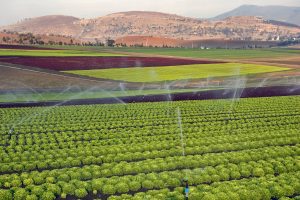
SFF Tasmania believes that farmers are the lifeblood of Tasmania. As such, they deserve the support of politicians who will protect their right to farm free from interference, and who won’t pander to city-centric ideologies that have no connection to the land they claim to protect. SFF Tasmania believe there is a growing need to protect Tasmania’s biosecurity, and ensure Tasmanian people can afford to eat high quality, healthy local foods. Over the last 12 months, supermarket shelves were emptied as locally grown produce was sent to the mainland and overseas to restock their broken supply chains. While Tasmania has the ability to be the food bowl of the nation, it should never come at the expense of our own people. We have a responsibility to ensure Tasmanians have affordable access to the wonderful bounty of fresh foods grown and produced here and that all Tasmanians can afford to eat healthy.
If elected, SFF Tasmania will use their vote in parliament to:
- Recommend a legislated right to farm policy that will give Tasmanian farmers the security they need knowing they will not be subject to nuisance lawsuits or harassment by activists.
- Restore and strengthen private property rights, particularly for farmers, that allow them the right to earn a living free from extremist behaviours and interference. This would include recommending tougher penalties for farm invasions and livestock theft for activism purposes, as well as the removal of tax-free status from any charitable organisation that promotes illegal activity.
- Recommend grant programs that incentivise farmers to explore regenerative farming activities and encourage young farmers to continue to work in the agricultural sector.
- Recommend restrictions on how much local produce can be exported out of the state.
- Campaign for tax breaks for farmers and primary producers.
- Limit foreign ownership of agricultural land and businesses and to recommend majority ownership must remain with a Tasmanian or Australian citizen.
- Introduce programs that help farmers to donate excess produce and foods to charities and homeless shelters.
- Support the expansion of agricultural, forestry and mining industries balanced by the sustainable utilisation of all natural resources.
- Protecting our food security also means protecting our farmers’ rights to earn a living free from extremist behaviours and interference.
- Increase funding for state-wide bio-security facilities to protect marine and land-based agriculture from threats such as fruit fly, blueberry rust, green snail and other bio-threats to our farmers and growers.
Climate and Environment Policy
As passionate outdoor enthusiasts, SFF Tasmania has a strong motivation to protect our natural environment through intelligent, data-driven conservation efforts. As such, they support the exploration and development of alternative, renewable energy sources and greener technologies. They also support responsible farming, fishing and agricultural practices that do the least harm to the natural environment and ensure the sustainable use of natural resources.
If elected, SFF Tasmania will use their vote in parliament to:
- Introduce community education programs that encourage the public to take personal responsibility for their energy consumption and for reducing personal waste.
- Introduce free energy efficiency audit programs and assistance with energy efficient appliances for pensioners.
- Protect vulnerable native fauna from the destruction caused by feral cats by introducing a bounty on feral cats in state and national forests and on agricultural land.
- Develop grant programs to encourage farmers to explore regenerative farming practices and carbon sequestering.
- Severely limit and restrict the use of inhumane and destructive biological poisons to control wildlife and problem animals.
Recreational Access Policy
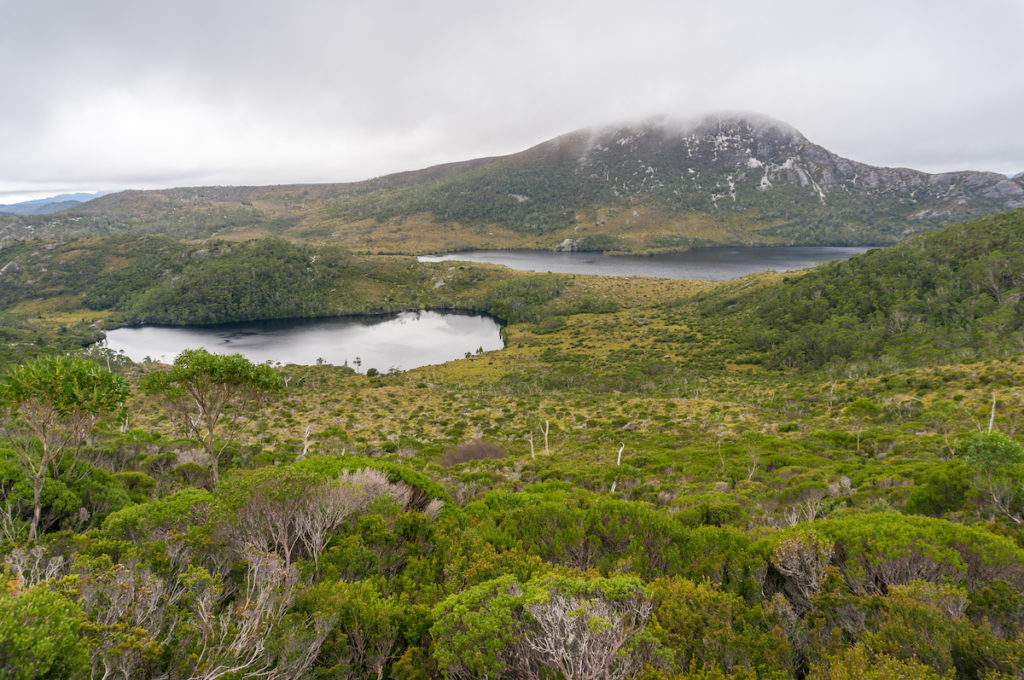 SFF Tasmania believes that the great outdoors is meant to be enjoyed by all and will fight for your freedom to use public land and waterways for recreational activities. For too long, the governments have kowtowed to green lobbying groups, locking up vast tracts of wilderness, public land and waterways in a failed bid of pushing preservation over sustainable use of natural resources. Public land and waterways, and their natural resources, should be held in trust for the people. No one group or individual should own or be able to limit access to public lands and waterways. All Tasmanians should be freely able to enjoy public land and waterways to pursue a broad and diverse range of recreational activities and outdoor pursuits.
SFF Tasmania believes that the great outdoors is meant to be enjoyed by all and will fight for your freedom to use public land and waterways for recreational activities. For too long, the governments have kowtowed to green lobbying groups, locking up vast tracts of wilderness, public land and waterways in a failed bid of pushing preservation over sustainable use of natural resources. Public land and waterways, and their natural resources, should be held in trust for the people. No one group or individual should own or be able to limit access to public lands and waterways. All Tasmanians should be freely able to enjoy public land and waterways to pursue a broad and diverse range of recreational activities and outdoor pursuits.
SFF Tasmania believes that the sustainable use of our natural resources has always been a part of the Tasmanian way of life. For as long as humans have inhabited the land, they have hunted, fished, and taken wildlife to sustain themselves and their cultures, as well as spending time in the outdoors pursuing a wide range of recreational pursuits.
Only recently has the ‘right’ to hunt, fish and forage been drawn into question by progressively restrictive government policies and laws. Anti-hunting and animal rights organisations would lead the public to believe that hunting, fishing and taking wildlife are privileges subject to social pressures and prevailing public sentiments rather than the inherent right to provide food for one’s self and family. To establish in perpetuity what has been assumed for eons, we must enshrine in law the right for citizens to hunt, fish and take wildlife, and to continue a consumptive, responsible and sustainable use of natural wildlife resources. It is part of our natural world, and long part of our traditions and cultures.
Australia’s track record of protecting such rights, especially those that emphasise communion with the countryside, the bush, wildlife and the consumptive use of their resources, is constantly declining, and the continual growth of urban ideologies and beliefs threatens the cultures and traditions many of us have taken for granted.
In line with our support for regional and rural communities, we also believe that one of the most effective ways to grow the economies in these communities is through recreational tourism. Access needs to be opened for people to visit and spend time in rural and regional areas, including wilderness areas, national parks and state forests, and to contribute to regional economies.
If elected, SFF Tasmania will use their vote in parliament to:
- Ensure Tasmanians have free and unimpeded access to public land and can use this land to enjoy a wide and diverse range of recreational activities.
- Ensure Tasmanians can continue to hunt, fish and forage for wildlife and wild foods.
- Create a foundational principle of beneficial use of natural resources that requires (where appropriate) that wildlife resources will not be wasted.
- Support the creation of hunter education programs that foster safe and ethical hunting practices.
- Push for the removal of current bans to bowhunting of introduced and invasive species.
- Recommend that hunting and fishing be considered the preferred means of managing wildlife rather than unproven contraception schemes and unwarranted use of government contract shooters and the use of toxic poisons. We will also recommend that any government culling and control programs should attempt to utilise the harvested animals to the fullest extent.
- Establish a strong regulatory framework that ensures proper enforcement of rules, regulations, seasons and limits around hunting and fishing, and which includes mandatory fines and/or sentencing for illegal killing and taking of wildlife, and/or cruelty to animals.
- Push for traditional hunting methods to be allowed including archery and hunting with dogs.
- Investigate the economic, social and environmental contributions that hunting and fishing brings to Tasmania and explore the advancement of a wide range of recreational tourism opportunities including hunting and fishing.
- Recommend funding to assist, encourage and facilitate youth to take part in outdoor recreational activities.
- Improve access within National Parks and State Forests for four wheel driving, camping, mountain biking, motorbiking and ATVing and other recreational activities.
- Improve facilities in National Parks and State Forests including developing more free or low-cost camping facilities
- Stop the unreasonable closure of tracks and parks, and support the reopening of those closed without valid reason.
- Recommend more free, low-cost camping and tourism facilities be developed around the state.
- Recommend a food bank program where recreational hunters and fishers can donate meat to those less fortunate.
Recreational Fishing Policy
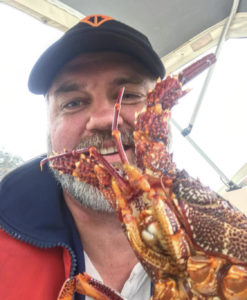 SFF Tasmania recognises that Tasmania has a vibrant and passionate angling community made up of both freshwater and saltwater fishers. Recreational fishing is an important cultural tradition for more than 100,000 Tasmanians, or around 20% of the total population. People from all walks of life and all demographics take part in fishing, and it is deeply entrenched in our way of life. Tasmanians have been fishing our coastal and inland waterways since our First Nations arrived her. Today, recreational fishing contributes over $168m to the Tasmanian economy each year.
SFF Tasmania recognises that Tasmania has a vibrant and passionate angling community made up of both freshwater and saltwater fishers. Recreational fishing is an important cultural tradition for more than 100,000 Tasmanians, or around 20% of the total population. People from all walks of life and all demographics take part in fishing, and it is deeply entrenched in our way of life. Tasmanians have been fishing our coastal and inland waterways since our First Nations arrived her. Today, recreational fishing contributes over $168m to the Tasmanian economy each year.
Recreational fishing is both a healthy activity and a sustainable way to put healthy, organic food on the table. As such, SFF Tasmania believes that recreational fishing should be enshrined as a fundamental right and have the full support of the Tasmanian government, and that all Tasmanians should be free to take part without undue impediment by government bureaucracy.
Tasmanian fisheries are an important natural resource that is primarily shared between the commercial sector and recreational fishers. However, sharing of this resource has not always been equitable and is often heavily weighted in favour of commercial fishing. This has inevitably led to unsustainable overfishing of marine fisheries that has seen many of our key marine species become depleted.
A 2018/19 assessment of Tasmanian scale fisheries by IMAS revealed that Tasmania’s key recreational fish species fall into five sustainability categories: sustainable, recovering, depleting, depleted and undefined.
Sustainable species include Tiger Flathead, Australian Sardine, Australian Salmon, Gould’s Squid, Jack Mackerel, Jackass Morwong, Yellow Eye Mullet, Snook, Eastern School Whiting, and Wrasse.
Recovering species include Striped Trumpeter.
Depleting species include Sand Flathead and Southern Calamari.
Depleted species include Bastard Trumpeter, Blue Warehou and Southern Garfish.
Undefined species include Barracouda, Flounder, Leather Jacket and Long-Snouted Boarfish.
While not included in the assessment, SFF Tasmania would like to add Southern Rock Lobster, Tasmanian Scallop and the tuna families to the list of fisheries that will need further attention and lobbying in order to rebuild, while still guaranteeing access for Tasmanian recreational sea fishers.
SFF Tasmania believes there must be better management of our various fisheries based on sound, scientific principles of sustainability that take into account issues such as climate change, invasive species, commercial overfishing of key species, excessive fish farming practices and exploitation from foreign interests and ownership. They believe that a more scientific and equitable management of fisheries would result in full recovery of our struggling fisheries, and see many of our depleted species returned to a sustainable status.
If elected, SFF Tasmania will use their vote in parliament to:
- Lobby for a healthy marine environment with healthy recreational fish populations.
- Lobby for sensible change to our sea fisheries that considers climate change and the effect it may have on recreational sea fisheries.
- Recommend additional funding to improve policing of Tasmania’s coastline and marine resources both on land and at sea. An increase of policing capacity would also alleviate the issues that exist when transiting from the West Coast Lobster Zone to the East Coast Lobster Zone by water when opening dates differ.
- Demand an immediate action plan that addresses depleting, depleted or undefined fish species, as outlined in the IMAS assessment.
- Resist planned closures of recreationally significant coastline and waterways in Tasmania for Marine Protection Areas (MPAs).
- Resist any further reclassification in status of existing MPAs that further seek to restrict recreational fishing.
- Protect all facets of recreational fishing that is proven, through proper science and management, to be sustainable or low impact.
- Lobby for a guaranteed statewide Total Allowable Recreational Catch (TARC) for Southern Rock Lobster of 170t with a minimum recreational share to increase as the resource rebuilds. Current arrangements are not guaranteed or indicative to the catch being made and is heavily criticised for setting regulations based on the full 100% of TARC rather than the 30% of TARC currently caught.
- Demand a fair and equitable resource share of Southern Rock Lobster that halts any further reductions in daily bag limits and guarantees that Southern Rock Lobster can continue to be taken in the future without further restrictions on the small percentage of the TARC currently allocated.
- Allow for a flexible daily bag limit from year to year that takes into consideration current stocks, and which builds as the rock lobster biomass rebuilds. Daily bag limits for rock lobster should not drop below the current guaranteed baseline of 2 fish per day.
- Demand an action plan that would see Southern Rock Lobster return to at least 50% of its original biomass.
- Lobby for acknowledgement by the government that the recreational rock lobster fishing sector only takes a fraction of their current allocation and that any increases in catch is simply a healthy sign of recovery and not a sign of an expanding recreational angling sector.
- Lobby for an increase in fishing opportunities, particularly the reintroduction of the recently closed traditional recreational Rock Lobster winter fishery.
- Examine current resource share arrangements for Sand Flathead to help reverse the trend of declining stock.
- Lobby for a cessation or immediate cap of foreign ownership of our Commonwealth and State fisheries resources, in particular, rock lobster, abalone and fish farm businesses. While this measure is precautionary, it does have the scope to prevent further pressure being placed on already heavily overfished areas by foreign influences.
- Ensure recreational fishing remains a right for those Tasmanians who choose to partake in this activity.
- Resist any banning of current legal fishing practices in Tasmania and to instead lobby for increased fishing opportunities.
- Resist any attempt to remove the partially protected status of wild brown trout in Tasmania or any attempt to eradicate wild trout from Tasmanian
- Recognise the economic benefit recreational fishing tourism brings to Tasmania.
- Address the continual decline by successive governments in daily bag limits, as well as the loss of fish habitat and stock levels through poor management.
- Resist the introduction of a marine recreational scale fish licence and seek a guarantee that one will never come into existence.
What is I Am Hunter?
I Am Hunter wants to change the way hunting is perceived and to change the conversation from a negative one driven by anti-hunters to a positive one led by hunters.
Our goal is to help hunters become positive role models and ambassadors for hunting, while simultaneously helping non-hunters understand why hunting is important.
You can become a supporter and help us achieve our goal and spread a positive message about hunting with the wider community.
Related content
Our other channels
Follow us on Facebook
Follow us on Instagram
YouTube
Subscribe to our YouTube channel.
Get our newsletter
Get our free monthly newsletter direct to your inbox
Listen on iTunes
Listen to our podcast on iTunes.
TV series
Watch I Am Hunter episodes on My Outdoor TV (MOTV)

